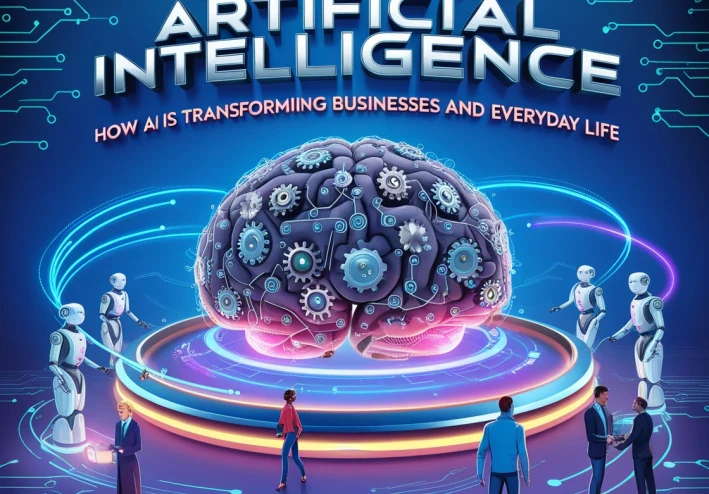
The Importance of Artificial Intelligence: How AI Is Transforming Businesses and Everyday Life
The Silent Revolution: How Artificial Intelligence Is Reshaping Business and Redefining Daily Life
Artificial Intelligence (AI) has transcended the realm of science fiction and theoretical research to become the defining technological force of our era. No longer confined to laboratories or niche applications, AI is rapidly integrating into the fabric of both global commerce and our routines, driving unprecedented efficiency, innovation, and convenience. Its importance cannot be overstated; it represents a fundamental shift in how we solve problems, create value, and interact with the world. This article explores the profound and multifaceted importance of AI, examining its transformative impact on businesses and its pervasive influence on everyday life
The Engine of Business Transformation: AI in the Corporate World
For businesses, AI is less a tool and more a strategic imperative. It's reshaping industries, creating new markets, and forcing incumbents to adapt or risk obsolescence. Its importance lies in its unique ability to process vast amounts of data, identify complex patterns, learn from experience, and automate tasks far beyond the capabilities of traditional software or human effort alone. Here’s how AI is revolutionizing the business landscape
Unleashing Unprecedented Operational Efficiency
Hyper-Automation: AI-powered Robotic Process Automation (RPA) is automating complex, rule-based tasks across departments – finance (invoice processing), HR (resume screening), supply chain (inventory management), and customer service (initial ticket routing). This reduces errors, speeds up processes, and frees up human talent for higher-value strategic work
Predictive Maintenance: AI algorithms analyze sensor data from machinery and equipment to predict failures *before* they happen. This minimizes costly downtime in manufacturing, energy, and transportation, optimizing maintenance schedules and extending asset lifespans
Supply Chain Optimization: AI models forecast demand with greater accuracy, optimize logistics routes in real-time considering traffic and weather, manage warehouse inventory dynamically, and identify potential disruptions, creating resilient and cost-effective supply chains
Revolutionizing Customer Experience (CX)
Hyper-Personalization: AI analyzes customer data (purchase history, browsing behavior, demographics, sentiment) to deliver highly personalized experiences. This includes tailored product recommendations (Amazon, Netflix), customized marketing messages, and individualized website interfaces, significantly boosting engagement and conversion rates
24/7 Intelligent Support: AI-powered chatbots and virtual assistants handle routine customer inquiries instantly, anytime, anywhere. Natural Language Processing (NLP) allows them to understand complex queries, resolve common issues, and seamlessly escalate more complex problems to human agents, improving resolution times and satisfaction
Sentiment Analysis: AI tools monitor social media, reviews, and support interactions in real-time to gauge customer sentiment. Businesses gain immediate insights into brand perception, emerging issues, and opportunities for proactive engagement
Fueling Data-Driven Decision Making & Innovation
Advanced Analytics: AI sifts through massive datasets (structured and unstructured) to uncover hidden trends, correlations, and insights far beyond human analytical capacity. This empowers leaders to make strategic decisions based on concrete evidence rather than intuition
Risk Management & Fraud Detection: Financial institutions leverage AI to analyze transaction patterns in real-time, identifying anomalies indicative of fraud with high accuracy. Similarly, AI assesses credit risk more effectively and helps insurers detect fraudulent claims
Accelerating R&D: In pharmaceuticals, AI analyzes molecular structures to predict drug efficacy and accelerate discovery. In materials science, it simulates and designs new materials with desired properties. In software development, AI assists with code generation, testing, and debugging
Driving New Products, Services, and Business Models
AI-Powered Products: From smart home devices (voice assistants, learning thermostats) to autonomous vehicles and intelligent enterprise software, AI is becoming the core intelligence embedded within new product categories
Personalized Services: Subscription boxes curated by AI, personalized fitness and nutrition plans generated by algorithms, and AI-driven financial advisors are examples of entirely new service models enabled by this technology
Platforms & Ecosystems: Businesses are building AI platforms (e.g., cloud-based AI services like AWS SageMaker, Google Cloud AI, Azure ML) that allow other companies to leverage sophisticated AI capabilities without massive in-house infrastructure, fostering innovation ecosystems
The Invisible Hand: AI in Everyday Life
The importance of AI extends far beyond the corporate sphere. It has subtly, yet profoundly, woven itself into the fabric of our daily routines, enhancing convenience, safety, health, and entertainment, often without us even realizing it
The Personalized Digital Assistant
Smartphones & Smart Speakers: Voice assistants like Siri, Google Assistant, and Alexa leverage AI for speech recognition, natural language understanding, and task execution (setting reminders, playing music, controlling smart home devices, answering questions)
Predictive Text & Smart Replies: AI anticipates your next word while typing messages or emails and suggests quick, contextually relevant responses
Smarter Living & Entertainment
Streaming Services: Netflix, Spotify, and YouTube use sophisticated AI recommendation engines to analyze your viewing/listening history and preferences, suggesting content you're likely to enjoy, keeping you engaged
Smart Homes: AI optimizes energy use by learning your heating/cooling patterns (smart thermostats), enhances security through intelligent cameras that distinguish between people, pets, and vehicles, and automates lighting and appliances
Navigation & Transportation: Real-time traffic prediction and route optimization in apps like Google Maps/Waze rely heavily on AI. Ride-sharing apps use AI for matching drivers and riders efficiently and for dynamic pricing
Transforming Communication & Content
Real-Time Translation: AI powers increasingly accurate real-time translation apps and features (like in Skype or Google Translate), breaking down language barriers
Spam & Phishing Filters: Email services use AI to continuously learn and identify spam and malicious phishing attempts with remarkable accuracy, protecting users
Content Creation & Curation: AI assists in generating basic news reports (sports scores, financial summaries), creating simple graphic designs, and even composing music or writing drafts, while also curating social media feeds
Revolutionizing Healthcare & Well-being
Medical Imaging Analysis: AI algorithms can analyze X-rays, CT scans, and MRIs faster and often with comparable or even superior accuracy to human radiologists in detecting anomalies like tumors or fractures, aiding in early diagnosis
Drug Discovery & Development: As in business R&D, AI accelerates the process of identifying potential drug candidates and predicting their effects
Personalized Medicine: AI helps analyze genetic data and patient history to tailor treatment plans and predict individual responses to therapies
Wearables & Health Monitoring: Smartwatches and fitness trackers use AI to analyze heart rate patterns for potential atrial fibrillation, track sleep stages, and provide personalized health insights
Enhancing Safety & Security
Fraud Detection for Consumers: Banks use AI to monitor individual account activity and flag suspicious transactions, protecting consumers
Cybersecurity: AI systems detect unusual network patterns and malware signatures in real-time, providing faster and more proactive defense against cyberattacks
Public Safety (Controversial): AI is used in some areas for facial recognition in security systems and predictive policing models (though these applications raise significant ethical concerns)
Navigating the Challenges: Responsible AI
While the importance and benefits of AI are immense, its rapid ascent necessitates careful consideration of significant challenges
Ethical Concerns: Bias in training data can lead to discriminatory AI outcomes (e.g., in hiring or loan applications). Ensuring fairness and transparency ("explainable AI") is crucial
Privacy Implications: AI's reliance on massive data collection raises serious questions about data ownership, consent, and surveillance
Job Displacement: AI-driven automation will inevitably displace certain jobs, requiring significant workforce retraining and social safety net adjustments
Security Risks: Malicious use of AI (deepfakes, autonomous weapons, sophisticated cyberattacks) poses new threats
Accountability & Control: Determining responsibility when AI systems make harmful decisions and ensuring human oversight ("human-in-the-loop") remains complex
Conclusion: Embracing the AI Future
Artificial Intelligence is not just another technological trend but a foundational shift with profound and far-reaching implications. Its importance lies in its unparalleled ability to augment human capabilities, unlock new levels of efficiency and insight, solve complex global challenges, and create entirely new possibilities in both business and personal life. From optimizing global supply chains to recommending our next favorite song, diagnosing diseases to securing our online accounts, AI is already deeply embedded in our world
The transformative power of AI demands not only adoption but also responsible stewardship. Businesses that fail to strategically integrate AI risk falling behind. Societies must proactively address the ethical, economic, and social challenges it presents through thoughtful regulation, education, and continuous dialogue. The future belongs not to AI alone, but to the synergy between human ingenuity and artificial intelligence. By embracing its potential while navigating its complexities with wisdom and foresight, we can harness AI to build a future that is more prosperous, efficient, healthy, and ultimately, more human. The silent revolution is here, and its importance is only set to grow exponentially in the years to come
































